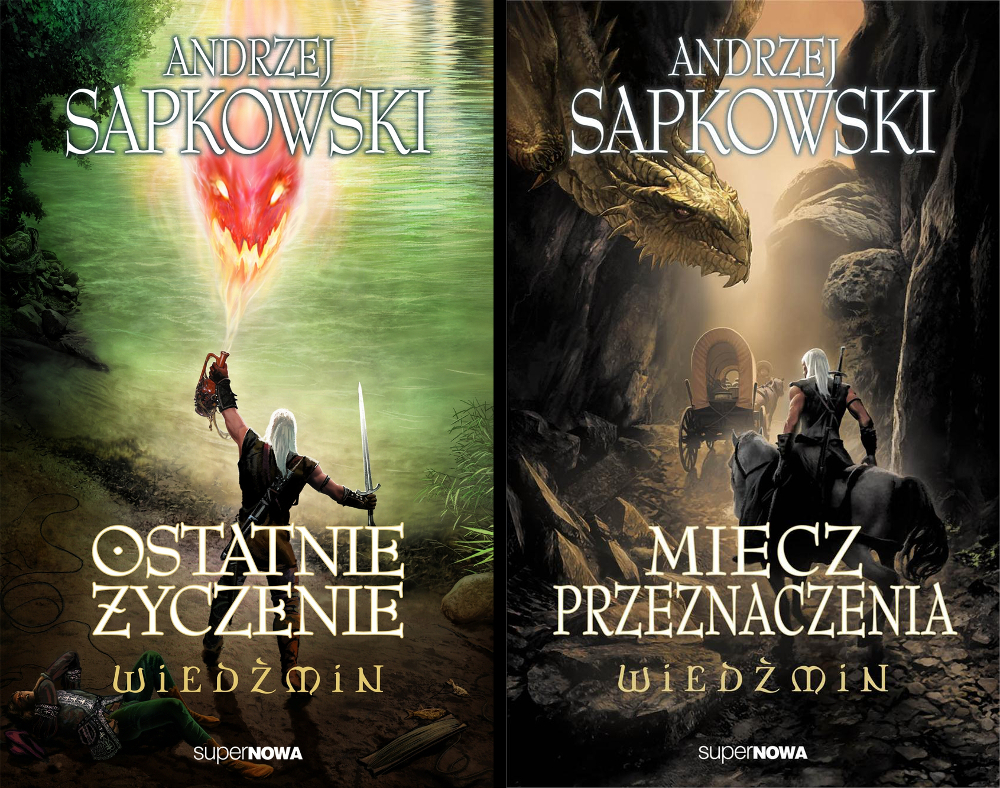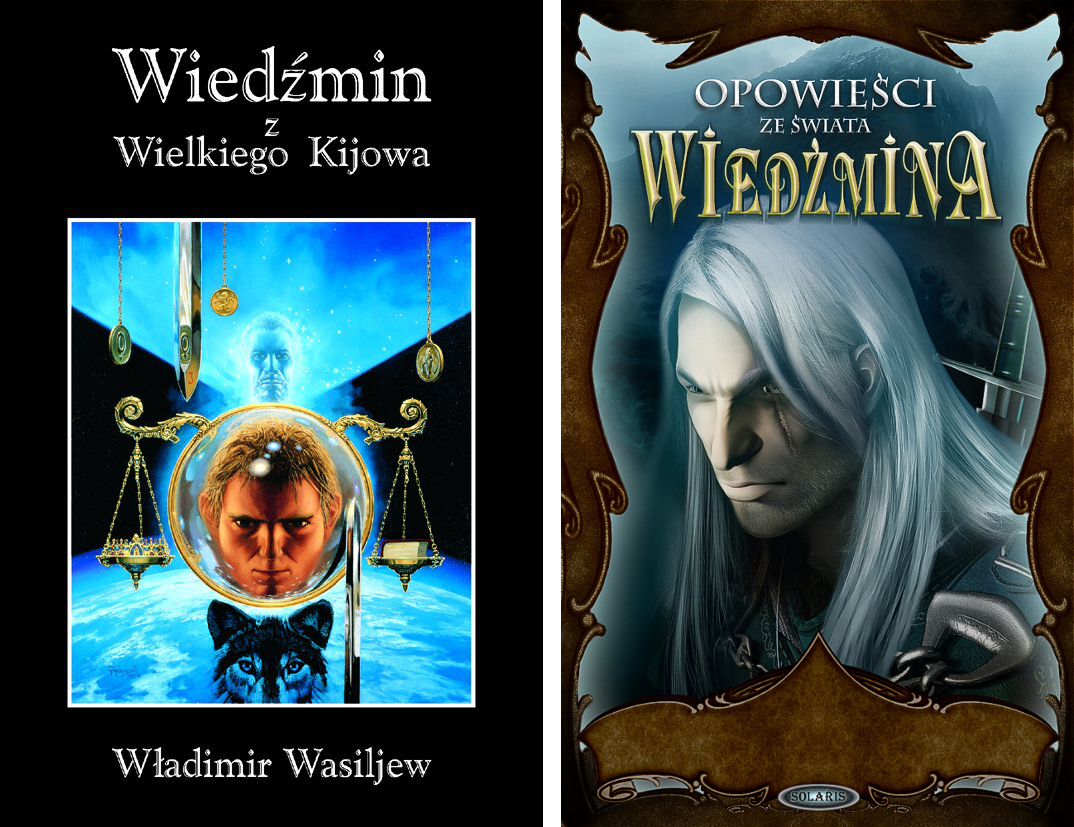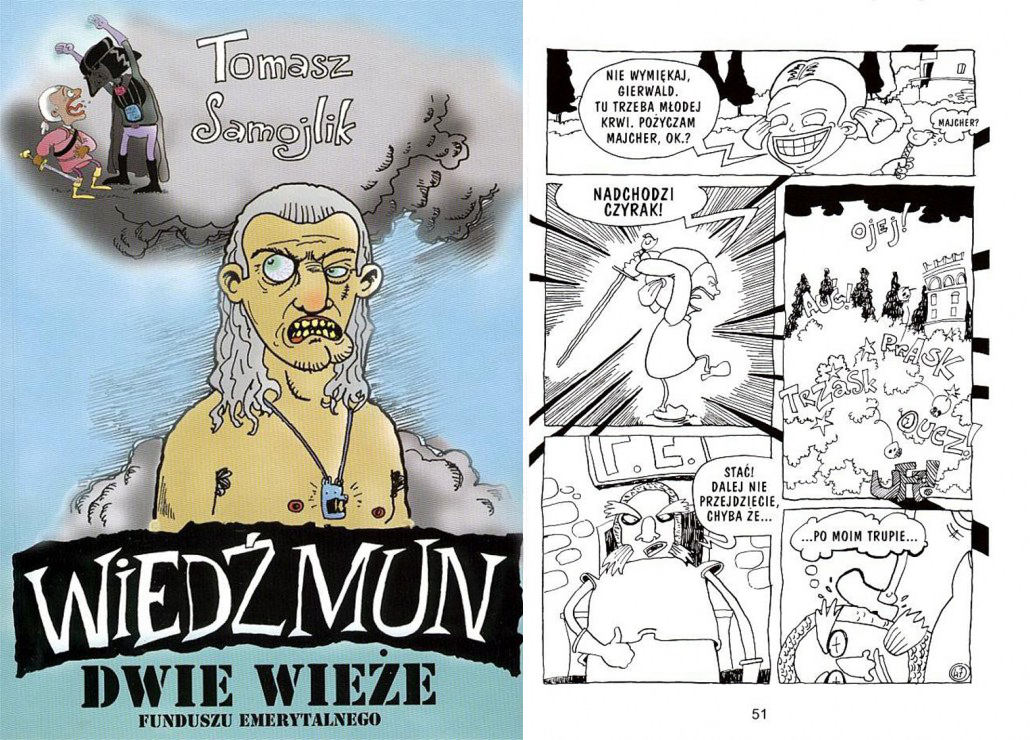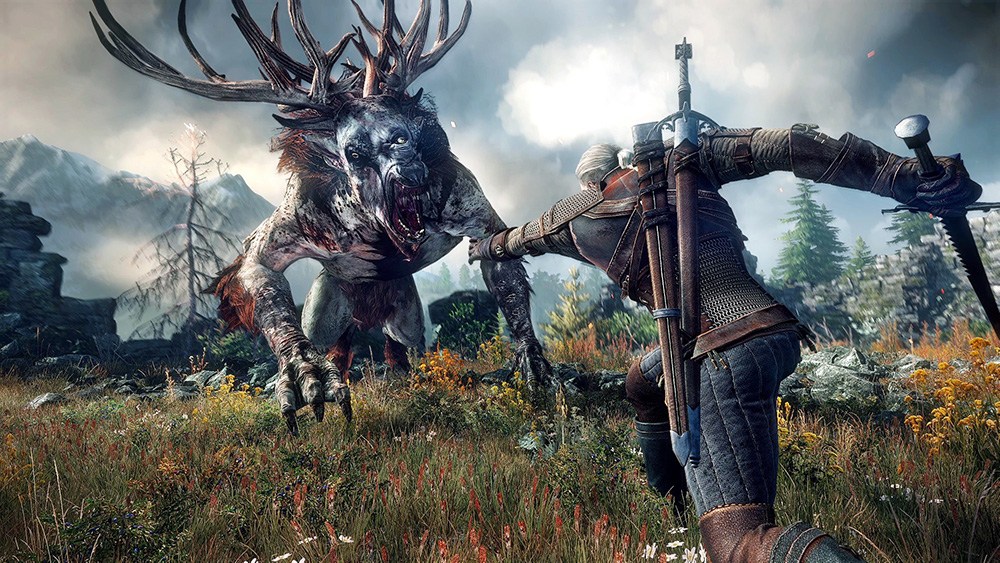The Witcher: The Road From Rivia to Hollywood
He speaks more than 20 languages and has turned his name into a well-known brand around the world, from Brazil to Japan. But there’s no sign of him slowing down. For over 30 years now, we have been observing the White Wolf’s impressive march across all forms of media. As he moves into the streaming platform Netflix, Culture.pl looks back at all his different incarnations across the years.
The December 1986 edition of Fantastyka monthly featured a short story about a mysterious monster killer, the white-haired Geralt of Rivia. This character was the creation of Andrzej Sapkowski (nicknamed AS by his readers, which in turn means 'Ace' in Polish), who made his debut in the magazine as the translator of Cyril M. Kornbluth’s The Words of Guru three years before. The Witcher was recognised by the jury of a creative writing contest, beating over a thousand other contestants. The short story won third prize (ex aequo), following only Ciernie (Thorns) by Jan Maszczyszyn and the winning short story Yoo Retoont, Sneogg: Ay Noo by Marek S. Huberath. Sapkowski’s short story stood out for its ‘outstanding style and intriguing plot’, the latter of which would determine the Witcher’s brilliant career.
In October 2016, Sapkowski received the World Fantasy Award for lifetime achievement and, that December, Geralt of Rivia turned 30. Now his adventures can be followed in a dozen short stories, a several novels, and numerous literary variations. Moreover, he has become the main character in comics, TV and feature films, a rock opera, and a hugely successful series of video games. Despite all this, he’s not done yet – his 33rd birthday is set to be his biggest yet with his latest depiction streamed into homes around the world via Netflix.
So how did we get here? Below Culture.pl presents (almost) all the incarnations of the Witcher.
Literature

Before the White Wolf set off overseas for the first time, he had already won the hearts of European readers. At first, Sapkowski was going to dedicate himself to translations only, but the editors of Fantastyka magazine asked him for another Witcher story after his aforementioned initial short. The creation of a morally unequivocal fantasy world, founded on Slavic and Celtic mythology and Arthurian legends, that made use of and at the same time argued with Tolkien’s vision, while being full of intertextual references to the Polish and world canons of literature could not have gone unnoticed. That foreign editors should notice the potential of the Witcher universe – ‘Sienkiewicz’s style and Chandler’s wit’, as Maciej Parowski, a writer, critic, and secretary of the aforementioned contest said on Polish Radio – was only a matter of time.
Four years after he had been introduced to Polish readers, Geralt was presented to Russians (in an anthology of Polish fantasy literature) and Ukrainians (in Всесвіт magazine). By 1993, Sapkowski’s works had been published fourteen times east of Poland. And in the south, in the Czech Republic – ‘Vědmák’, later known as ‘Zaklínač’, appeared in 1991 as a translation of the short story Mniejsze Zło (Lesser Evil), which bears a somewhat perverted resemblance to the fairy tale of Snow White. His popularity grew exponentially in that country; the subsequent volumes of his saga were published approximately one year after their Polish premiere, and Sapkowski himself collected awards from Czech literary critics and fantasy readers (such as an Ikaros award and an award from the Academy of Science Fiction, Fantasy and Horror Literature). The subsequent translations of his works into Lithuanian, German, Spanish, French and Portuguese were published before 2007, when the first of the video games featuring the White Wolf was launched by CD Projekt RED.
However, a long time had to pass for the Witcher to be introduced to the English-speaking public. Although the year 2000 saw The Hexer – translated by Agnieszka Fulińska – published in the short-story collection Chosen by Fate: Zajdel Award Winner Anthology by SuperNOVA in co-operation with the Silesian Club of Fantasy Literature (its book cover was designed by Tomasz Bagiński), it went unnoticed. Only during the promotion of the game version of The Witcher were readers offered the translation by Danuta Stok (The Last Wish published in the UK in 2007 and in the USA in 2008), followed by that of Michael Kandel (Spellmaker published in 2010 in A Polish Book of Monsters), who also translated the works of Stanisław Lem and Jacek Dukaj. The English edition of the fifth volume of the saga – Lady of the Lake – hit the market in 2017.
The time had come to penetrate other markets: from Serbia and Bulgaria, through Italy, Finland and Brazil, all the way to China and Japan (in the latter two countries, the title in Polish is printed on the book cover next to its translation).

The Witcher’s universe is so inspiring that fantasy writers – and authors of other literary genres – draw on it heavily, which not infrequently results in pastiche or even travesty. Want to see Geralt wearing jeans, armed with a cell phone and notebook, hunting rebellious robots while riding a taxi? Yes, but only in the cyberpunk world of Vladimir Vasiliev. His Witcher of Grand Kiev also appears in Tales of the Witcher World, a tribute to Sapkowski by Russian and Ukrainian writers. The anthology includes better as well as worse stories, with altered versions of the characters (Geralt as such appears in the stories by Mikhail Uspienskij, but it is Dandelion who is the main character), visions of the world (Alexander Zolotko, whose ‘occupiers’ are stationed near Legnica, has drifted farthest away from the canonical vision), and linguistic humour (an excellent short story by Belanin about Geralt and Yennefer set in contemporary times). No less interesting is a feminine look offered by Czech writer Petra Neomillnerova – the author of Lota – and by Olga Gromyko of Belarus who tells the story of Wolha Redna, a witch.
Comics
The literary Witcher became a phenomenon, but in the 1990s readers were not yet prepared for the story to be told by means of any other medium than as a book. A comic adaptation was problematic due to the form – brave dialogues and intertextual games had to be simplified a lot, and, due to aesthetics, the image of Geralt and the world presented in a graphic novel could differ profoundly from readers’ expectations.
The first attempt was made by Maciej Parowski (the script written together with Sapkowski) and Bogusław Polch (illustrations). While the plot was relatively faithful to the original prose, the substitution of clean lines – known from Funky Koval – with thicker and less precise art and the use of subdued shades of brown, yellow, and black hardly excited readers. Geralt sporting a pony tail and a characteristic fringe became the hero of six comic books: The Road with No Return, Geralt, Lesser Evil, The Last Wish, Border of Ability and Betrayal, which were published in the 1993-1995 editions of Komiks magazine. The last part of the saga, which was an original concept, marked the end of the magazine. As time went by, the scepticism towards the work by Polch and Parowski grew weaker, and subsequent editions of the comic followed in 2001 and 2015.
Cover of the comic 'The Witcher: Curse of Crows', photo: press materialsOver nearly three decades, at least a few attempts were made to turn the Witcher into a successful comic. Maciej Parowski tried again in 2007, this time collaborating with Przemysław Truściński (the designer of Geralt’s image in the video game). However, the promising project of six comics based on the novel’s plot came to naught. The year 2011, however, witnessed the publication of a work by Michał Gałek (script), Arkadiusz Klimek and Łukasz Poller (art). The two-comic series Reason of State was an original concept based in the Witcher universe, the illustrations of which are reminiscent of French productions. The convergence of the date with the launch of the CD Projekt product was not a coincidence.
The story of the White Wolf attracted the attention of American publishing house Dark Horse Comics. The Witcher: House of Glass written by Paul Tobin, a winner of the Eisner Award, with art by Joe Querio, was published in 2014. This is a self-contained story full of horror, whose eerie climate is intensified by gloomy and often very simple drawings. The duo also created a follow-up entitled The Witcher: Fox Children based on Sapkowski’s novel Season of Storms. On the last day of August 2016, the third part of the American series, The Witcher: Curse of Crows, had its premiere. This time the adventure of Geralt and Ciri with the involvement of werewolves and strigas was illustrated by Polish artist Piotr Kowalski, who had previously collaborated with Marvel publishing house (on the Hulk) and with Stephen King (on a comic based on The Dark Tower series).
 Tomasz Samojlik, cover and card of The Wutcher, photo: Aleja Komiksu / www.alejakomiksu.com
Tomasz Samojlik, cover and card of The Wutcher, photo: Aleja Komiksu / www.alejakomiksu.com
It would be improper not to mention the parody by Tomasz Samojlik. In his The Wutcher – Destiny of Sword (2001) Gierwald Zrywi fights with a murderous hair-stylist szczyga and discovers the mystery of the Holy Grill, and during a trip to the two towers of the retirement fund (in 2003), he meets old friends: Dżenifer (Yennefer) the witch, Katarakta (Cataract) the bard, and Czyrak (Boil) the Kinder Surprise.
Film
After a comic adaptation of the Witcher prose, it was time to try make it into a motion picture. With its all-star cast (Michał Żebrowski – Poland's most popular actor at the time – starred as Geralt, and all the episodes featured the best Polish actors), a big budget (almost 19 million PLN, making the production one of the ten most expensive Polish movies produced since 1989), an extensive marketing campaign, but most of all, the fact it was based on a brilliant piece of prose (in absolutely every aspect of the word) and already had a cult hero, the project was deemed a sure thing.
Alas, following the premiere of The Witcher (or The Warlock) in 2001, the director Marek Brodzki and the scriptwriter Michał Szczerbica, who withdrew his name from the opening credits, were hit by a strong wave of criticism. The failure was said to have resulted from overly excessive modification of the literary archetype and from making the plot's structure too episodic, which was surely a result of the film being made from a chopped up and unreleased TV series finally aired a year later in 2002. The production was rather discouraging and the 13-episode TV series was acclaimed mostly by those who hadn’t read Sapkowski’s books.
But then along came plans for a new 2017 production. This time the film would be directed by Tomasz Bagiński, associated with Platige Image, and in co-operation with the US Sean Daniel Company. The full-length debut of the author of the Academy Award-nominated animation The Cathedral was meant to be based on two short stories: The Witcher and Lesser Evil, which were to be translated into the language of film by Hollywood scriptwriter Thania St. John, who had previously worked on Buffy the Vampire Slayer and Roswell. No particulars were known apart from that Geralt was going to be played by an English-speaking actor, its budget would range between 20 and 30 million USD, and Bagiński dreamt about shooting the film in Poland. The director said in an interview for the Polish Filmmakers Association:
We have to be aware that, by American standards, we are telling a rather low-key story with a few spectacular action scenes shot in the open air. There are going to be elaborate sets and special effects, but don’t expect the battle of the five armies. This is not going to be a blockbuster. The script came to us as a sort of quite wise, Slavic Crouching Tiger, Hidden Dragon. The main objective is to present our protagonist in the widest and deepest dimension possible, and in such a way that viewers who do not know Sapkowski’s literature or the games featuring the Witcher can enter his world, and fall in love with it perhaps. If we achieved this goal with the film, maybe a sequel would follow…
Now that it's 2019, we know that this project morphed into something else entirely: a TV series for the Netflix streaming platform. Bagiński was still involved, but now as executive producer, working closely with the project's showrunner Lauren Schmidt Hissrich. Although many fans had originally rallied online for Mads Mikkelsen, due to his similar appearance to previous incarnations, the English-speaking actor playing Geralt turned out to be Henry Cavill of Superman fame.
Embeded gallery style
display gallery as slider
But the most intriguing development was that the plan was to now convert the entire eight books into a multi-season show, a veritable smorgasbord of Continent action. Even before the first season had aired, a second had already been greenlit. But will all eight books really make it into the small screen? In the past, Netflix has ruthlessly cancelled several shows that had large fanbases, so at the time of writing, it's anybody's guess.
For those fans that were still hoping for a film, they were keenly rewarded with 'a film by fans for fans'. The crowd-funded Alzur's Legacy took four years to make by its team of keen Witcher enthusiasts. Although it may not have the gloss of Netflix's high production values, its dive into lesser known parts of Witcher lore was highly appreciated by fans, even though newcomers were left a little confused as to why it wasn't about Geralt of Rivia (hint: it's set after his saga is over).
Outside of film and TV, Bagiński has also co-authored computer game trailers, specifically those for The Witcher game series. The undisputed success of the game by CD Projekt RED made the Witcher a globally-recognised brand name, and not only among fantasy fans. The studio started work on its first own role-playing game in 2003. As they wrote on their website:
For us, it was a great return to the literature of Andrzej Sapkowski, whose books and short stories soaked up our days and nights in high school and university. And when it turned out that the copyright on the plot was available for the purpose of game development, we felt like we’d achieved the impossible.
 Still from the game The Witcher: Wild Hunt, photo: press materials of the producer
Still from the game The Witcher: Wild Hunt, photo: press materials of the producer
And so it really was. The first video game (The Witcher, released in autumn 2007) was a commercial success, but the best was yet to come. The subsequent parts of the game trilogy hit the market in 2011 and 2015, and sales exceeded 20 million copies. Pre-orders of The Witcher 3: Wild Hunt reached 1.5 million copies in 109 countries, and the production budget, which exceeded 300 million PLN, was earned back in its entirety in just the first day of sales. Awarded over 800 times, including 251 Game of the Year awards, this production by a Warsaw studio became the most awarded video game in history.
Players were enchanted by its masterful production of an exotic Slavic world hitherto unknown to Westerners, the high quality extra content, and the degree of respect shown by the authors to their customers (taking users’ opinions into account with free-of-charge extensions). Last but not least, Sapkowski was also appreciative of CD Projekt's achievements while admitting, however, that he did not play games (although long ago he did create Oko Yrrhedesa (The Eye of Yrrhedes), one of the first Polish fantasy role-playing games).
Since then, CD Projekt Red has continued satisfying fan thirst with Gwent, a game recreating the card game that characters in the Witcher universe play against each other, and Thronebreaker, an RPG strategy game putting players in charge of attacking armies.
Theatre
 Promo art for the game 'The Witcher: Wild Hunt', photo: press materials
Promo art for the game 'The Witcher: Wild Hunt', photo: press materials
The architectural design of the digital Novigrad resembles that of the city of Gdańsk – one of the buildings is the spitting image of the famous mediaeval port crane (Żuraw). But the Tricity is associated with the Witcher due to one other reason. The Music Theatre in Gdynia created a musical based on Sapkowski’s book, which it inaugurated in 2017/2018 theatrical season. The show continues to be staged regularly, with English subtitles for foreign fans coming to visit. The direction and script are the responsibility of Wojciech Kościelniak, the music is composed by Piotr Dziubek, the lyrics by Rafał Dziwisz, and the set designed by Damian Styrna. The positive reviews it garnered were to be expected since the Gdynia team had already succeeded in making stage adaptations of the Polish literature classics The Doll and The Peasants. Kościelniak says:
We want to prepare an attractive performance, with extensive use of modern technology. We want to show an interesting and picturesque world – different from everything that we have ever done in this theatre.
However, The Witcher put on by the Music Theatre in Gdynia was not the first time the White Wolf had stepped out on stage. In 2009 in Rostov-on-Don, the Russian sympho-rock band Esse presented their rock opera Road Without Return (a title taken from a tale about Geralt’s parents). The musical narration, focussed on the life of Princess Cirilla, lacks more typical adventurous scenes, with a lot of characters absent in comparison to the literary plot, and the blunt language used by Sapkowski is substituted with a poetic libretto. In order to underline the emotional layer, the show's creators combined various styles: from jazz improvisation through doom and power metal, to elements of folk with the sound of flute and mandolin. Despite a pathos sometimes bordering kitsch, it has to be admitted that to putting this fantasy world into these musical genres was a bold experiment.
So, after 33 years, only time will tell if Geralt of Rivia is going to surprise us with even more bold appearances…
Originally written in Polish by Agnieszka Warnke, Oct 2016, updated by AZ, Dec 2019
Sources: ’Wiedźmin: Bohater Masowej Wyobraźni’ by R. Dudziński et al. (Wrocław 2015); ‘Wiedźmin: Polski Fenomen Popkultury’ by R. Dudziński and J. Płoszaj (Wrocław 2016); andrzejsapkowski.pl, cdprojekt.com, portalfilmowy.pl, Gazeta Wyborcza, Polish Radio, own materials
[{"nid":"5688","uuid":"6aa9e079-0240-4dcb-9929-0d1cf55e03a5","type":"article","langcode":"en","field_event_date":"","title":"Challenges for Polish Prose in the Nineties","field_introduction":"Content: Depict the world, oneself and the form | The Mimetic Challenge: seeking the truth, destroying and creating myths | Seeking the Truth about the World | Destruction of the Heroic Emigrant Myth | Destruction of the Polish Patriot Myth | Destruction of the Flawless Democracy Myth | Creation of Myths | Biographical challenge | Challenges of genre | Summary\r\n","field_summary":"Content: Depict the world, oneself and the form | The Mimetic Challenge: seeking the truth, destroying and creating myths | Seeking the Truth about the World | Destruction of the Heroic Emigrant Myth | Destruction of the Polish Patriot Myth | Destruction of the Flawless Democracy Myth | Creation of Myths | Biographical challenge | Challenges of genre | Summary","topics_data":"a:2:{i:0;a:3:{s:3:\u0022tid\u0022;s:5:\u002259609\u0022;s:4:\u0022name\u0022;s:26:\u0022#language \u0026amp; literature\u0022;s:4:\u0022path\u0022;a:2:{s:5:\u0022alias\u0022;s:27:\u0022\/topics\/language-literature\u0022;s:8:\u0022langcode\u0022;s:2:\u0022en\u0022;}}i:1;a:3:{s:3:\u0022tid\u0022;s:5:\u002259644\u0022;s:4:\u0022name\u0022;s:8:\u0022#culture\u0022;s:4:\u0022path\u0022;a:2:{s:5:\u0022alias\u0022;s:14:\u0022\/topic\/culture\u0022;s:8:\u0022langcode\u0022;s:2:\u0022en\u0022;}}}","field_cover_display":"default","image_title":"","image_alt":"","image_360_auto":"\/sites\/default\/files\/styles\/360_auto\/public\/2018-04\/jozef_mroszczak_forum.jpg?itok=ZsoNNVXJ","image_260_auto":"\/sites\/default\/files\/styles\/260_auto_cover\/public\/2018-04\/jozef_mroszczak_forum.jpg?itok=pLlgriOu","image_560_auto":"\/sites\/default\/files\/styles\/560_auto\/public\/2018-04\/jozef_mroszczak_forum.jpg?itok=0n3ZgoL3","image_860_auto":"\/sites\/default\/files\/styles\/860_auto\/public\/2018-04\/jozef_mroszczak_forum.jpg?itok=ELffe8-z","image_1160_auto":"\/sites\/default\/files\/styles\/1160_auto\/public\/2018-04\/jozef_mroszczak_forum.jpg?itok=XazO3DM5","field_video_media":"","field_media_video_file":"","field_media_video_embed":"","field_gallery_pictures":"","field_duration":"","cover_height":"991","cover_width":"1000","cover_ratio_percent":"99.1","path":"en\/node\/5688","path_node":"\/en\/node\/5688"}]